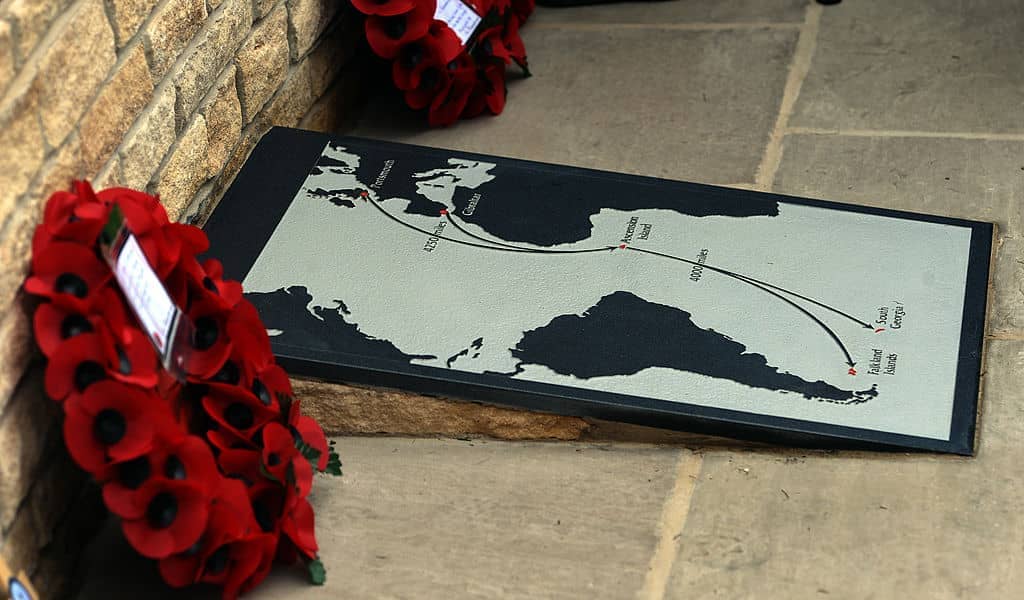Today marks 40 years since Operation Rosario, when Leopoldo Galtieri’s commandos landed on the Falkland Islands and began an invasion that prompted the Falklands War. The Guardian has commemorated the occasion with an unapologetic op-ed by the Argentinian government swearing itself to reasserting control over the islands. Foreign minister Santiago Cafiero, author of the op-ed, declares that ‘the recovery of sovereignty is an inalienable objective of the Argentine people’ and says ‘no Argentine government will cease in its pursuit of our sovereign claim’.
Cafiero’s op-ed is full of self-pity but utterly lacking in self-reflection. There is no acknowledgement that his country, then a military dictatorship, overran a tiny, peaceable island population who chiefly spent their days fishing and farming. No apology for an act of aggression that resulted in a conflict killing more than 900 Britons and Argentines. No recognition that 99.8 per cent of islanders voted to remain British in a 2013 referendum with a 92 per cent turnout. Cafiero and his country continue to wallow in revanchist nostalgia, which is what Britain’s blue-tick academics would call it if Liz Truss penned an article in the Vincentian yearning to reassert sovereignty over St. Vincent and the Grenadines. As it is, our academics are too busy reporting their colleagues for believing in biology to take an interest in these matters.
Nonetheless, Cafiero’s intervention prompts a thought. The sovereignty of the Falklands is not in dispute: they are British territory. However, they are a territory we too often treat as an afterthought. That is when we’re not hand-wringingly embarrassed about the idea of Britain having overseas territories in the modern era. (There was a debate in 1982 about whether Britain could or even should attempt to liberate the islands after Galtieri’s invasion.) Islanders don’t even get a vote in UK parliamentary elections, meaning that if Argentina ever had another go, the same debate would likely arise again. This is what happens when you don’t have a say in electing the governments that decide your fate.
There is another anniversary coming up: the 40th anniversary of Argentina’s surrender, on June 14. On the Falklands, they call it Liberation Day. The government should mark it by announcing that it will give the Falkland Islands an opportunity to be incorporated into the United Kingdom. This would necessitate the repeal of Falkland Islands Constitution Order 2008, which is naturally premised on the Falklands being constitutionally distinct from the UK, and the islands would require a new designation that reflected both their incorporation and their politically and culturally distinctive history. They might be classified as an ‘island city’ or an ‘island region’ of the UK.
As part of the UK, the Falklands could still be afforded a similar level of autonomy to what it enjoys today. If it went down the ‘island city’ route, the Legislative Assembly could be replaced by a city council and the Governor by a mayor. The islands would become a Commons constituency and elect one MP at every general election. There are currently two constituencies for Legislative Assembly elections — Camp and Stanley — but a unified Falklands constituency, with vastly fewer electors than the UK average, would hand the islanders an outsized influence at the ballot box. This would also mean that Falkland Islanders could potentially become ministers or even prime minister one day.
The islanders, being a redoubtable people, might decide they are quite happy being British in their own way and keeping arrangements as they are. If so, the status quo ought to remain, though this only underscores the importance of constructing an offer of incorporation that leaves day-to-day life on the islands virtually unchanged.
To sweeten the deal, ministers should float an increased military presence on the islands, perhaps by expanding Mount Pleasant and Mare Harbour, and by the funding and expansion of the Falkland Islands Defence Force. This would bring not only greater security but economic activity to the islands. This is important given the new approach being taken by the Argentinians, with their talk of ‘connectivity’ and ‘the re-establishment of regular flights’ to bring ‘more trade, more tourism and more dialogue’ to the ‘Malvinas’.
Incorporation would finally give the islanders a seat at the table and a say in determining the defence policies on which they rely for their protection. Argentina may talk these days about retaking the islands in a manner ‘respectful of the way of life of their inhabitants and according to the principles of international law’ but it nonetheless remains ‘a permanent and unrelinquished goal of the Argentine people’ to recover ‘an integral part of the national territory’. Whether through warfare, lawfare or other means, Buenos Aires is bent on reasserting its rule over the Falklands and incorporation into the UK would make it infinitely harder for a future British government to surrender to any of these tactics.
Incorporation would also give a confidence boost to Britain, whose intellectuals, politicians and corporate class believe they are living in a globally-reviled yesterday-land growing smaller, meaner and more insignificant because a bunch of oiks voted the wrong way in a referendum six years ago. Britain is actually a pretty good country, so good that people living on the opposite side of the world want to be part of it.







Comments